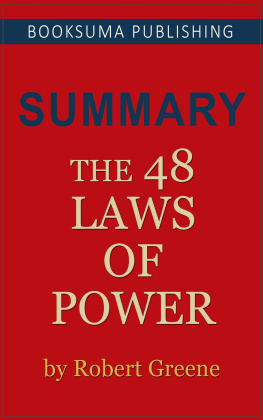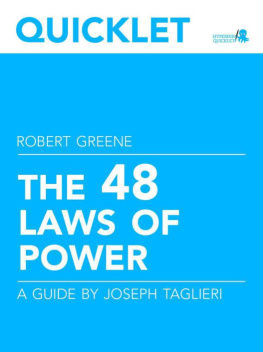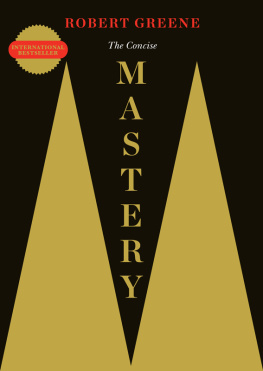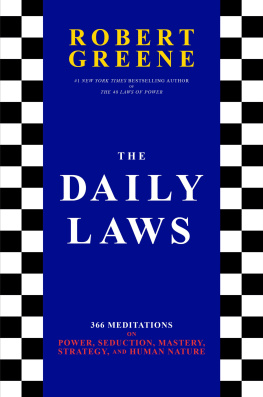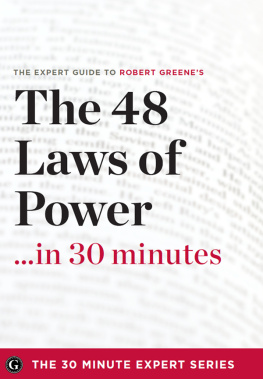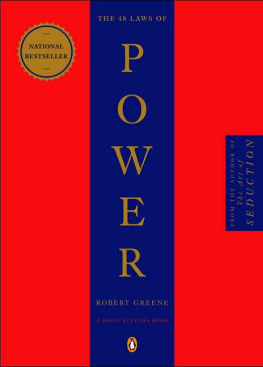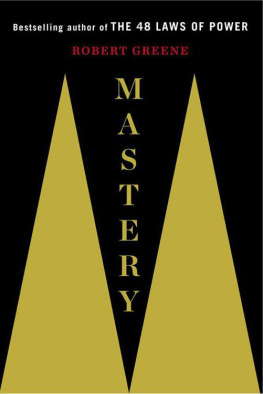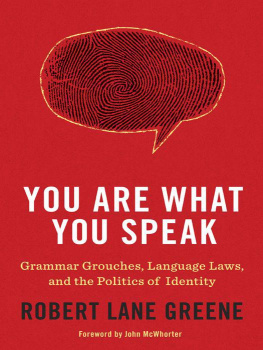Summary of
The 48 Laws of Power by Robert Greene
By
BookSuma Publishing
2018 BookSuma Publishing
This is an UNOFFICIAL summary and analysis of the subject book. Please note that this summary and analysis is not affiliated, authorized, approved, licensed, or endorsed by the subject books author or publisher.
This books publisher and author make no warranties or representations regarding the accuracy or completeness of the contents of this book and specifically disclaim any implied warranties of merchantability or fitness for a particular purpose. Content and price subject to change without notice.
No part of this publication may be reproduced, stored in a retrieval system, or transmitted in any form or by any means, electronic, mechanical, photocopying, scanning, recording, or otherwise, except as permitted under Sections 107 or 108 of the 1976 United States Copyright Act, without either the prior written authorization from the Publisher or Author.
Table of Contents
Introduction to The 48 Laws of Power
W hen Robert Greene first developed some of the ideas that eventually became the book The 48 Laws of Power , he was working, comfortably but rather unhappily, as a writer in Hollywood. This put him in a position to be able to observe the rich and powerful. He saw that many of these people shared traits strikingly similar to those of powerful historical figures, such as Julius Caesar, and decided it may be useful to collect these ideas in a single book. In 1995, he pitched his idea to book packager Joost Elffers.
That book became The 48 Laws of Power , and was first published in 1998. The purpose of the book was to serve as a practical guide for those who want to either become powerful themselves or arm themselves against the powerful. According to Greene, the 48 laws contained in the book are distilled from 3,000 years of history and from careful observations of figures like Sun Tzu, Niccol Machiavelli, Haile Selassie I, Queen Elizabeth I, Henry Kissinger, Carl von Clausewitz, and P.T. Barnum.
Since then, The 48 Laws of Power was become a sensation, touted as a game changer by everyone from Warren Buffet to Jay-Z. In fact, in Jay-Zs 2011 PrimeTime, he actually raps about the book.
The 48 Laws of Power has sold over 1.2 million copies in the U.S. alone and has been translated into 24 languages. Fast Company declared the book a "mega cult classic", and The Los Angeles Times wrote that the book turned Greene into a cult here.
Thats not to say that The 48 Laws of Power hasnt drawn plenty of criticism. Some people lambast the book as immoral and Machiavellian. It has been labeled as a guide book for backstabbers. Greene has responded to these criticisms by saying, These laws ... people might say, 'Oh they're wicked', but they're practiced day in and day out by businesspeople. You're always trying to get rid of your competition and it can be pretty bloodthirsty, and that's just the reality."
**Please note that this summary of The 48 Laws of Power by Robert Greene is NOT the original book. This book was written and published by BookSuma and is not affiliated with or endorsed by Robert Greene.**
Law 1: Do Not Outshine the Master
Y ou should strike to always make those who are above you feel comfortable in their superiority. Thats not to say you shouldnt try to impress them or please them, but if you go too far, you might actually do just the opposite. You might make them feel afraid or insecure.
Instead, make your masters seem more bright than you are and you will reach the heights of your own power one day.
Law 2: Be Wary of Friends and Learn to Use Your Enemies
A lways be wary of your friends. They are more likely than others to become envious of you, so they will be apt to betray you more quickly. They can also become spoiled and harsh very quickly.
You have more reason to be afraid of your friends than of your enemies. If you want someone on your side who is loyal, turn to a former enemy. This former enemy will have something to prove. If you dont have an enemy, figure out how you can make them.
Law 3: Hide Your Intentions
W hen you act, dont ever reveal to others the reasons behind your actions. This keeps people off balance. Its better for you if others are in the dark. If they dont know the purposes for your actions, they cant prepare a defense.
You can even trying guiding others down the wrong path. Give them the wrong impression, surround them with smoke and haziness, so that by the time they realize your true intentions, it will be too late.
Law 4: Say Less Than Is Necessary
D ont try to impress people with your words. Even if you are a wordsmith, in general, the more you say, the simpler you appear. You also start to sound desperate and out of control. People who say less come across are more powerful and intimidating. The more words that come out of your mouth, the more likely you are to say something thoughtless.
Of course, there are times when it is not wise to be completely silent. Silence can around suspicious. In these situations, say something vague and open to interpretation. Others cannot deceive you or overcome you if they are not sure about your position.
Next page
